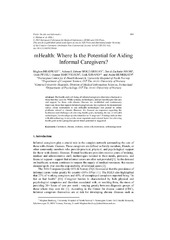Blar i forfatter "Issom, David-Zacharie"
-
Dataset of motivational factors for using mobile health applications and systems
Henriksen, André; Issom, David-Zacharie; Woldaregay, Ashenafi Zebene; Pfuhl, Gerit; Årsand, Eirik; Sato, Keiichi; Hartvigsen, Gunnar (Journal article; Tidsskriftartikkel; Peer reviewed, 2023-09-16)We created and carried out a cross-sectional anonymous structured questionnaire on what motivates users of mobile health applications and wearables to share their collected health related data. The questionnaire was distributed online in English, French, and Norwegian. In addition, a flyer with information of where to locate the online questionnaire was distributed during a Swiss health conference. ... -
Expectations of users and non-users of wearable sensors and mobile health applications
Henriksen, André; Pfuhl, Gerit; Woldaregay, Ashenafi Zebene; Issom, David-Zacharie; Årsand, Eirik; Sato, Keiichi; Hartvigsen, Gunnar (Chapter; Bokkapittel, 2022-08-22)Patient self-management is vital to improved health outcomes for patients with chronic diseases. The objective of this study was to understand the role of wearable sensors in patients’ self-management. A survey encompassing factors related to motivation in mHealth was conducted. Ease of use and sensory accuracy was found most important when choosing a wearable. Manual registration of most health-related ... -
Factors Influencing Motivation and Engagement in Mobile Health Among Patients With Sickle Cell Disease in Low-Prevalence, High-Income Countries: Qualitative Exploration of Patient Requirements
Issom, David-Zacharie; Henriksen, André; Woldaregay, Ashenafi Zebene; Rochat, Jessica; Lovis, Christian; Hartvigsen, Gunnar (Journal article; Tidsskriftartikkel; Peer reviewed, 2020-03-24)<i>Background</i>: Sickle cell disease (SCD) is a hematological genetic disease affecting over 25 million people worldwide. The main clinical manifestations of SCD, hemolytic anemia and vaso-occlusion, lead to chronic pain and organ damages. With recent advances in childhood care, high-income countries have seen SCD drift from a disease of early childhood mortality to a neglected chronic disease of ... -
mHealth: Where Is the Potential for Aiding Informal Caregivers?
Bradway, Meghan; Woldaregay, Ashenafi Zebene; Issom, David-Zacharie; Pfuhl, Gerit; Hartvigsen, Gunnar; Årsand, Eirik; Henriksen, André (Journal article; Tidsskriftartikkel; Peer reviewed, 2021)The health and well-being of informal caregivers often take a backseat to those that they care for. While systems, technologies, and services that provide care and support for those with chronic illnesses are established and continuously improved, those that support informal caregivers are less explored. An international survey about motivations to use mHealth technologies was posted to online ... -
Preliminary Evaluation of a mHealth Coaching Conversational Artificial Intelligence for the Self-Care Management of People with Sickle-Cell Disease
Issom, David-Zacharie; Rochat, Jessica; Hartvigsen, Gunnar; Lovis, Christian (Journal article; Tidsskriftartikkel; Peer reviewed, 2020)Adherence to the complex set of recommended self-care practices among people with Sickle-Cell Disease (SCD) positively impacts health outcomes. However, few patients possess the required skills (i.e. disease-specific knowledge, adequate levels of self-efficacy). Consequently, adherence rates remain low and only 1% of patients are empowered enough to master the self-care practices. Health coaching ... -
Toward a Conversational Agent to Support the Self-Management of Adults and Young Adults With Sickle Cell Disease: Usability and Usefulness Study
Issom, David-Zacharie; Hardy-Dessources, Marie-Dominique; Romana, Marc; Hartvigsen, Gunnar; Lovis, Christian (Journal article; Tidsskriftartikkel; Peer reviewed, 2021-01-29)Sickle cell disease (SCD) is the most common genetic blood disorder in the world and affects millions of people. With aging, patients encounter an increasing number of comorbidities that can be acute, chronic, and potentially lethal (e.g., pain, multiple organ damages, lung disease). Comprehensive and preventive care for adults with SCD faces disparities (e.g., shortage of well-trained providers). ... -
User Expectations and Willingness to Share Self-Collected Health Data
Woldaregay, Ashenafi Zebene; Henriksen, André; Issom, David-Zacharie; Pfuhl, Gerit; Sato, Keiichi; Richard, Aude; Lovis, Christian; Årsand, Eirik; Rochat, Jessica; Hartvigsen, Gunnar (Journal article; Tidsskriftartikkel; Peer reviewed, 2020)The rapid improvement in mobile health technologies revolutionized what and how people can self-record and manage data. This massive amount of information accumulated by these technologies has potentially many applications beyond personal need, i.e. for public health. A challenge with collecting this data is to motivate people to share this data for the benefit of all. The purpose of this study is ... -
User Expectations and Willingness to Share Self-collected Health Data
Woldaregay, Ashenafi Zebene; Henriksen, André; Issom, David-Zacharie; Pfuhl, Gerit; Sato, Keiichi; Richard, Aude; Lovis, Christian; Årsand, Eirik; Rochat, Jessica; Hartvigsen, Gunnar (Journal article; Tidsskriftartikkel; Peer reviewed, 2020)The rapid improvement in mobile health technologies revolutionized what and how people can self-record and manage data. This massive amount of information accumulated by these technologies has potentially many applications beyond personal need, i.e. for public health. A challenge with collecting this data is to motivate people to share this data for the benefit of all. The purpose of this study is ... -
What motivates patients with NCDs to follow up their treatment?
Henriksen, André; Woldaregay, Ashenafi Zebene; Issom, David-Zacharie; Sato, Keiichi; Årsand, Eirik; Bradway, Meghan; Pfuhl, Gerit; Pelagatti, Susanna; Hartvigsen, Gunnar (Conference object; Konferansebidrag, 2021-05)The increasing use of mobile health (mHealth) tools for self-management is considered to be important to improve health effects for patients with chronic NCDs (noncommunicable diseases). This development is supported by an increasing number of available mHealth apps. The apps range from disease management apps (e.g., diabetes diary) to health and fitness apps (e.g., dietary apps and workout ...


 English
English norsk
norsk







